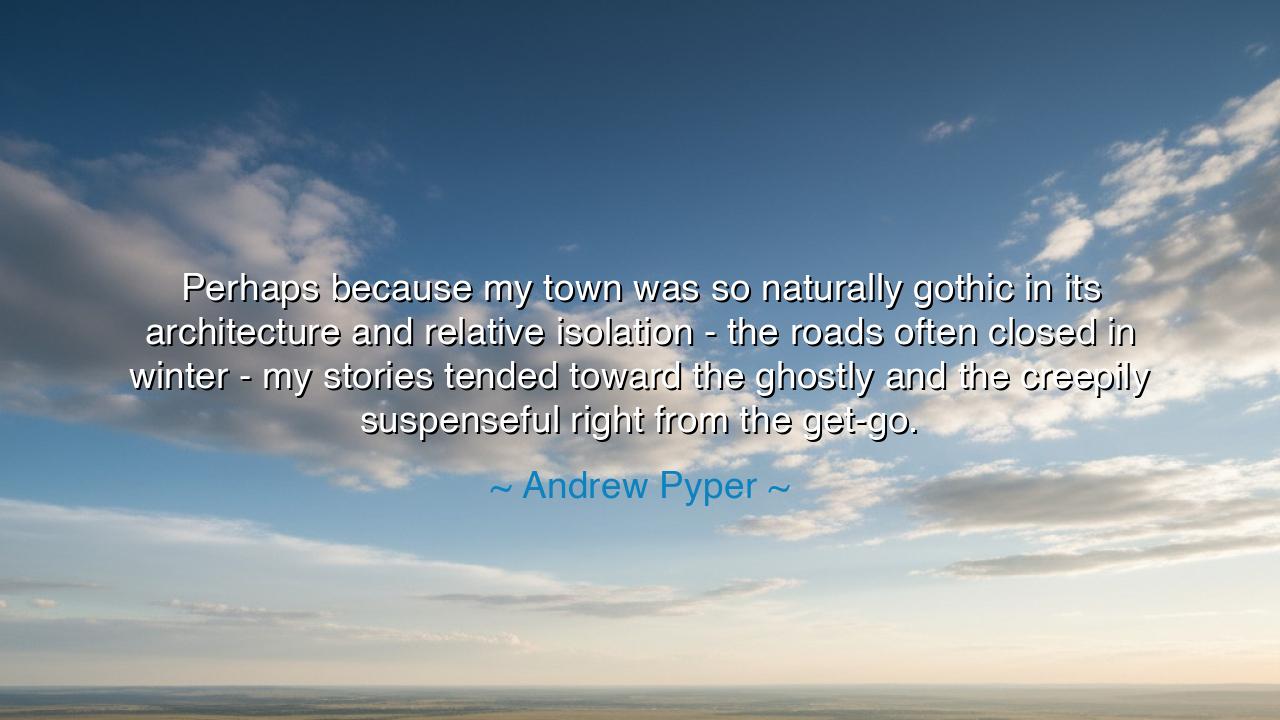
Perhaps because my town was so naturally gothic in its
Perhaps because my town was so naturally gothic in its architecture and relative isolation - the roads often closed in winter - my stories tended toward the ghostly and the creepily suspenseful right from the get-go.






Host: The room feels a little cooler now, the dim light from the lamp casting long, quiet shadows. Outside, the world is quiet, the wind rustling softly in the distance. Jeeny sits on the couch, her legs curled beneath her, lost in thought. Jack, standing near the window, looks out at the darkening world, his mind clearly reflecting on something. The atmosphere is still, as though a conversation is about to unfold.
Jeeny: “Jack, I came across a quote from Andrew Pyper today that caught my attention,” she says softly, breaking the silence. “He said, ‘Perhaps because my town was so naturally gothic in its architecture and relative isolation — the roads often closed in winter — my stories tended toward the ghostly and the creepily suspenseful right from the get-go.’ What do you think about that?”
Jack: He turns, a thoughtful expression crossing his face. “That’s really interesting. I think he’s saying that his environment, the place where he grew up, influenced his writing in a very specific way. It sounds like the gothic, isolated nature of his town shaped the stories he told — and not just the setting, but the atmosphere. The physical environment and the mood it creates are so powerful, they can directly influence a person’s creativity.”
Jeeny: “Exactly. His town was gothic in its architecture, isolated, and mysterious — almost like it had a life of its own. When you grow up in a place that feels haunted, both by history and physical space, it’s natural that the stories you create will mirror that. The ghostly and suspenseful elements in his writing aren’t just themes he chose, but almost a reflection of his surroundings.”
Host: The light in the room seems to deepen, as though the conversation is uncovering something more profound. Jeeny speaks with an understanding that our environments — whether physical, emotional, or social — play a significant role in shaping the stories we tell. Jack stands still, reflecting on how powerful a place can be in influencing not just our actions but the very ideas we create.
Jack: “It’s like the town itself is almost a character in his writing. The gothic architecture, the isolation, the way the roads close in winter — those elements don’t just set the scene, they shape the tone of his stories. His writing isn’t just about telling stories; it’s about capturing the essence of that place, the mood it creates. It’s a reminder that the world around us has a profound impact on our creativity.”
Jeeny: “Exactly. His surroundings gave him not just ideas, but an atmosphere to work with — one of mystery, suspense, and the supernatural. I think there’s something to be said for the way place can influence creativity. We often think of our thoughts and ideas as individual, but the world around us, the architecture, the weather, the landscape, can shape what we imagine and create in ways we might not even realize.”
Host: The quiet in the room deepens as the conversation turns to the power of environment in shaping creativity. Jeeny and Jack reflect on how the gothic, isolated nature of Andrew Pyper’s town influenced not only his stories but the very essence of them. The atmosphere of a place, with its unique qualities, is inseparable from the creative work that comes from it.
Jack: “It’s a reminder that place isn’t just the backdrop for stories; it’s a fundamental part of them. The mood of a town, its architecture, its isolation — all of those things bleed into how we imagine the world. Even if you’re not writing about the place itself, the feeling it gives you will shape what you create.”
Jeeny: “Absolutely. The environment isn’t just a setting. It’s part of the storytelling process itself. Pyper’s town was the perfect place for ghost stories and suspense. It shaped him as a writer, and the feeling of creepiness and mystery comes through in everything he creates.”
Host: The room feels quieter now, the conversation lingering on the idea that place plays a crucial role in shaping not just the stories we tell, but the very essence of our creativity. Jeeny and Jack sit together, reflecting on the influence of environment — how it can seep into our thoughts, emotions, and ultimately the stories we share with the world. Andrew Pyper’s words serve as a reminder that the physical world around us is not just a backdrop, but an active participant in our creative journeys.






AAdministratorAdministrator
Welcome, honored guests. Please leave a comment, we will respond soon